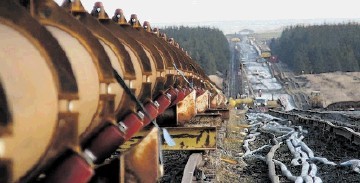
International offshore engineering firm Subsea 7, which has bases in the north and north-east, said yesterday its outlook in 2013 would be tempered by delays in project awards this year and by bottlenecks in the supply chain.
Following the comment in its third-quarter results, the Norwegian company’s shares fell by more than 2% initially, but ended the day up 3.5%.
Subsea 7 reported revenue of £1.09billion for the quarter, up almost £200million on the same period last year. Adjusted earnings before interest, taxes, depreciation, and amortisation (ebitda) were also ahead; by £24million to £199million.
Subsea 7’s order backlog rose to £5.08billion, compared with £4.97billion a year ago.
Chief executive Jean Cahuzac said: “These results reflect high offshore activity in west Africa, and high vessel utilisation in the North Sea. We are on track to deliver full-year adjusted ebitda in line with consensus expectations.
“We have not seen an impact from macroeconomic uncertainties on our clients’ plans, and tendering levels remain high, in particular in the North Sea, Africa and Brazil.”
He said the firm remained positive about medium and long-term market prospects, but expected next year’s outlook to be affected by the delays in 2012 awards and supply-chain bottlenecks. The CEO expected west Africa to move through a period of lower offshore activity in 2013 as delays to surf (subsea, umbilical, risers and flowlines) contract awards meant offshore execution of these new deals was likely to start in 2014 and beyond.
Mr Cahuzac said that, in the North and Norwegian seas, levels of tendering remained strong with improved pricing but added that it was still too early to be definitive about 2013.
At the start of this year, about 100 jobs at Subsea 7’s pipeline assembly plant near Wick were secured after it picked up a £63million contract with BP.
Subsea 7 also supports global operations out of its offices at Westhill, near Aberdeen. Mr Cahuzac said key challenges for the industry continued to be the availability of qualified and experienced workers, and the need to manage an increasingly tight supply chain and assure reliability in complex project delivery, adding: “We are well positioned to manage these challenges.”